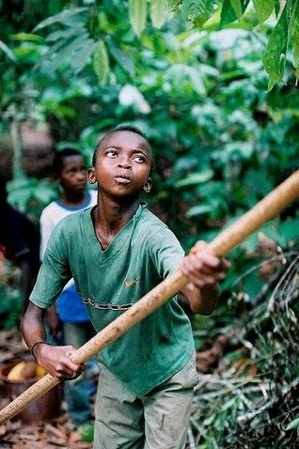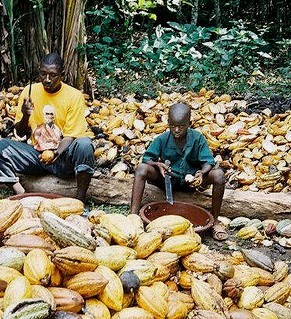|
Côte d'Ivoire Society | Human rights | Economy - Development | Agriculture - Nutrition | Labour Child labour in Ivorian cocoa farms still unchecked
Ever since 2001, the Chocolate Manufacturers Association (CMA) and the World Cocoa Foundation (WCF) have pledged to voluntary programmes to fight the extensive use of child labour in Ivorian and Ghanaian cocoa plantations. In Côte d'Ivoire, little has happened, new research shows.
This vulnerability indeed was exploited, the Malian and Burkinabe children and youths confirmed in interviews with the researchers. "Virtually all respondents experienced the worst forms of child labour including: verbal, physical and sexual harassment and restrictions of their freedom of movement," the survey found. Their young age was also abused to make the children perform hazardous work. "Virtually all respondents performed hazardous work including land clearing and burning, carrying heavy loads, spraying pesticides, and using machetes, among other dangerous activities," the researchers found. All in all, the recruitment of Malian and Burkinabe children to Ivorian cocoa plantations was still performed at a very large scale and by illegal means, the survey found. Also, it was documented, worst forms of child labour practices, child abuse and hazardous work was still the absolute norm of child labour on Ivorian farms. "It is clear from this report that the cocoa industry is not doing enough to address these problems," US rights and labour organisations today stated in response to the report. "The world's largest chocolate manufacturers must do more to monitor their supply chains to combat child labour, forced labour and human trafficking," they demand in a statement. The Payson Centre researchers conclude that too little is being achieved through the global chocolate industry's voluntary initiatives. Therefore, they recommend that companies "institute traceability systems for their cocoa supply chains starting at or near the farm level and work with product certification schemes." "All of the certification programmes operating in the West African cocoa sector should be reviewed to ensure that they appropriately identify and address child labour issues," they recommend. The report identifies major industry actors that had already made commitments in this area, which could serve as an example, they add. By staff writer © afrol News - Create an e-mail alert for Côte d'Ivoire news - Create an e-mail alert for Society news - Create an e-mail alert for Human rights news - Create an e-mail alert for Economy - Development news - Create an e-mail alert for Agriculture - Nutrition news - Create an e-mail alert for Labour news
On the Afrol News front page now
|
front page
| news
| countries
| archive
| currencies
| news alerts login
| about afrol News
| contact
| advertise
| español
©
afrol News.
Reproducing or buying afrol News' articles.
You can contact us at mail@afrol.com









